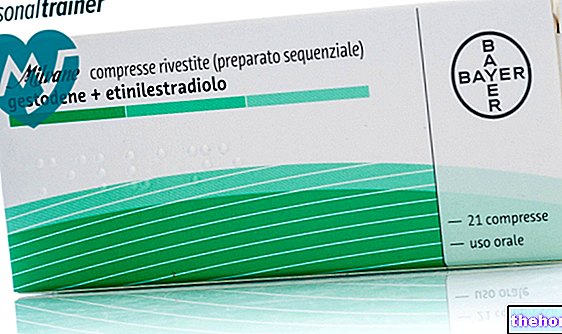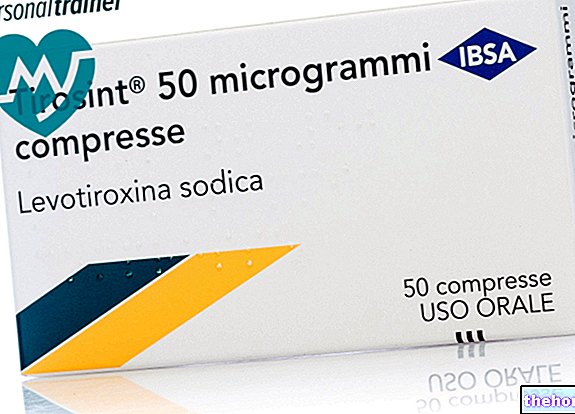Active ingredients: Liothyronine (Liothyronine sodium)
TI-TRE “20 MCG TABLETS” 50 TABLETS
Indications Why is Ti Tre used? What is it for?
PHARMACOTHERAPEUTIC CATEGORY
Thyroid therapy.
THERAPEUTIC INDICATIONS
Hypothyroidism.
Contraindications When Ti Tre should not be used
Hypersensitivity to the components; thyrotoxicosis; uncompensated heart failure.
Precautions for use What you need to know before taking Ti Tre
Thyroid preparations do not easily cross the placenta and clinical experience does not indicate any side effects on the fetus resulting from the administration of thyroid preparations to the mother during pregnancy.
If hypothyroidism is diagnosed during pregnancy, therapy with thyroid preparations should be initiated.
The administration of the product should not be interrupted in pregnant women, however it should take place in cases of real need and under the direct supervision of the doctor.
Although only small amounts of thyroid hormones are distributed in milk, thyroid preparations should be used with caution in breastfeeding women.
Interactions Which drugs or foods can modify the effect of Ti Tre
Liothyronine can determine an enhancement of the activity of antivitamin K and a mutual enhancement of tricyclic antidepressants. The administration of liothyronine requires a dosage adjustment of hypoglycemic agents. Cholestyramine and, probably barbiturates and ethionamide, reduce the action of thyroid hormones .
Intravenous diphenylhydantoin.
Warnings It is important to know that:
The product should be used with caution and under strict medical supervision in cases of myocardial infarction, angina pectoris, myocarditis, heart failure with tachycardia, arterial hypertension. Careful observation is required if sympathomimetic amines are administered to patients in this category. Patients with coronary artery disease treated with thyroid hormones should be carefully monitored during surgery as the likelihood of cardiac arrhythmias may be higher.
At the beginning of therapy with TI-TRE, in diabetics treated with insulin or with oral hypoglycemic agents and in patients on anticoagulant therapy, laboratory checks must be systematically carried out to avoid any phenomena of alteration and therefore to adapt the daily dosage again. Rare cases of hepatic dysfunction have been reported treated with thyroid preparations, it is recommended to reduce the dosage or to discontinue treatment if, during the course of therapy, fever, muscle weakness or abnormal liver function laboratory tests appear.
Venous diphenylhydantoin should not be administered during treatment with TI-TRE. Patients suffering from panhypopituitarism or other predisposing causes to adrenal insufficiency may react unfavorably to thyroxine: therefore it is advisable to start corticosteroid therapy before treatment with TI-TRE.
The use of drugs having hormonal activity on the thyroid gland for the treatment of obesity is dangerous because, at the necessary doses, it can cause secondary reactions, even of considerable seriousness.
TI-TRE contains lactose: in case of ascertained intolerance to sugars, contact your doctor before taking the medicine.
Dosage and method of use How to use Ti Three: Dosage
In myxedema, when you do not need an immediate effect, it is better to start treatment with small doses, from 10 to 20 mcg, gradually increasing them until reaching a total daily dose of 80-100 mcg in a few days. These doses are normally sufficient for maintenance but for its continuation it is advisable to administer thyroxine. In fact, the disadvantages of this substance in the treatment of hypometabolic manifestations become advantages in a therapy that must continue throughout life. In myxedema resistant to thyroid extract and thyroxine, triiodothyronine is irreplaceable.
The administration of the daily dose of TI-TRE should be divided into two or three times.
In children and the elderly the starting dose will be 5 mcg per day, then gradually increasing it according to the response. Since in patients with myxedema complicated by cardiac lesions a too rapid regularization of the metabolic situation can lead to serious complications, in these subjects a rigorous graduation of the dose is essential.
Overdose What to do if you have taken too much Ti Tre
Generally, acute overdose of thyroid preparations can produce the typical symptoms of hyperthyroidism. In this case, appropriate symptomatic and supportive therapy should be instituted immediately. Treatment consists mainly in reducing gastrointestinal absorption (induction of vomiting, gastric lavage) and in counteracting the central and peripheral effects, particularly those due to increased sympathetic activity (administration of digitalis if heart failure occurs, of beta-blockers to control sympathetic hyperactivity; adoption of suitable measures to control fever, hypoglycemia and fluid losses).
Side Effects What are the side effects of Ti Tre
Occasionally, especially at the beginning of therapy, or in cases of overdose, anginal pain, cardiac arrhythmias, increased blood pressure, palpitations and cramps of the skeletal muscles, tremors may occur. Tachycardia, diarrhea, insomnia, excitability, headache have also been reported. fever, hot flashes, menstrual irregularities, sweating, weight loss and muscle weakness.
In these cases it is advisable, on medical advice, to reduce the daily dosage or to suspend the treatment for a few days.
If undesirable effects not described above appear, contact your doctor or pharmacist.
Expiry and Retention
WARNING: do not use the drug beyond the expiration date shown on the package.
Deadline "> Other information
COMPOSITION
One tablet contains:
- ACTIVE INGREDIENT: Liothyronine sodium 20 mcg.
- EXCIPIENTS: sodium chloride; cornstarch; Arabic gum; magnesium stearate; lactose; povidone.
PHARMACEUTICAL FORM
Tablets: "20 MCG TABLETS" 50 TABLETS.
Source Package Leaflet: AIFA (Italian Medicines Agency). Content published in January 2016. The information present may not be up-to-date.
To have access to the most up-to-date version, it is advisable to access the AIFA (Italian Medicines Agency) website. Disclaimer and useful information.
01.0 NAME OF THE MEDICINAL PRODUCT -
TI-TRE 20 MCG TABLETS
02.0 QUALITATIVE AND QUANTITATIVE COMPOSITION -
One tablet contains:
ACTIVE INGREDIENT: liothyronine sodium 20 mcg.
03.0 PHARMACEUTICAL FORM -
Tablets.
04.0 CLINICAL INFORMATION -
04.1 Therapeutic indications -
Hypothyroidism.
04.2 Posology and method of administration -
In myxedema, when you do not need an immediate effect, it is better to start treatment with small doses, from 10 to 20 mcg, gradually increasing them until reaching a total daily dose of 80 - 100 mcg in a few days.
These doses are normally sufficient for maintenance but for its continuation it is advisable to administer thyroxine.
In fact, the disadvantages of this substance in the treatment of hypometabolic manifestations become advantages in a therapy that must continue throughout life.
In myxedema resistant to thyroid extract and thyroxine, triiodothyronine is irreplaceable.
The administration of the daily dose of TI-TRE should be divided into two or three times.
In children and the elderly the starting dose will be 5 mcg per day, then gradually increasing it according to the response.
Since in patients with myxedema complicated by cardiac lesions a too rapid regularization of the metabolic situation can lead to serious complications, in these subjects a rigorous graduation of the dose is essential.
04.3 Contraindications -
Hypersensitivity to the components; thyrotoxicosis; uncompensated heart failure.
04.4 Special warnings and appropriate precautions for use -
The product should be used with caution and under strict medical supervision in cases of myocardial infarction, angina pectoris, myocarditis, heart failure with tachycardia, arterial hypertension.
Careful observation is required if sympathomimetic amines are administered to patients in this category. Patients with coronary artery disease treated with thyroid hormones should be carefully monitored during surgery as the likelihood of cardiac arrhythmias may be higher.
At the beginning of therapy with TI-TRE, in diabetics treated with insulin or with oral hypoglycemic agents and in patients on anticoagulant therapy, laboratory checks must be systematically carried out to avoid any phenomena of alteration and therefore to adapt the daily dosage again.
Since rare cases of hepatic dysfunction have been reported in subjects treated with thyroid preparations, it is recommended to reduce the dosage or discontinue treatment if fever, muscle weakness or abnormal liver function laboratory tests occur during therapy.
Venous diphenylhydantoin should not be administered during treatment with TI-TRE.
Patients suffering from panhypopituitarism or other predisposing causes to adrenal insufficiency may react unfavorably to thyroxine: therefore it is advisable to start corticosteroid therapy before treatment with Ti-TRE.
The use of drugs having hormonal activity on the thyroid gland for the treatment of obesity is dangerous because, at the necessary doses, it can cause secondary reactions, even of considerable seriousness.
This medicine contains lactose: Patients with rare hereditary problems of galactose intolerance, the Lapp lactase deficiency, or glucose-galactose malabsorption should not take this medicine.
04.5 Interactions with other medicinal products and other forms of interaction -
Liothyronine can determine an enhancement of the activity of antivitamin K and a mutual enhancement of tricyclic antidepressants.
The administration of liothyronine requires a dosage adjustment of the hypoglycemic agents.
Cholestyramine and, probably barbiturates and ethionamide, reduce the action of thyroid hormones.
04.6 Pregnancy and breastfeeding -
Thyroid preparations do not easily cross the placenta and clinical experience does not indicate any side effects on the fetus resulting from the administration of thyroid preparations to the mother during pregnancy.
If hypothyroidism is diagnosed during pregnancy, therapy with thyroid preparations should be initiated.
The administration of the product should not be interrupted in pregnant women, however it should take place in cases of real need and under the direct supervision of the doctor. although only small amounts of thyroid hormones are distributed in milk, thyroid preparations should be used with caution in breastfeeding women.
04.7 Effects on ability to drive and use machines -
The product does not affect the ability to drive and use machines.
04.8 Undesirable effects -
Occasionally, especially at the beginning of therapy, or in cases of overdose, anginal pain, cardiac arrhythmias, increased blood pressure, palpitations and cramps of the skeletal muscles, tremors may occur.
Tachycardia, diarrhea, insomnia, excitability, headache, fever, hot flashes, menstrual irregularities, sweating, weight loss and muscle weakness have also been reported.
In these cases it is advisable, on medical advice, to reduce the daily dosage or to suspend the treatment for a few days.
04.9 Overdose -
Generally the acute overdose of thyroid preparations can produce the typical symptoms of hyperthyroidism.
In this case, appropriate symptomatic and supportive therapy must be instituted immediately. Treatment consists mainly in reducing gastrointestinal absorption (induction of vomiting, gastric lavage) and in counteracting the central and peripheral effects, particularly those due to increased blood pressure. sympathetic activity (administration of digitalis if heart failure occurs, beta-blockers to control sympathetic hyperactivity; adoption of suitable measures to control fever, hypoglycemia and fluid losses).
05.0 PHARMACOLOGICAL PROPERTIES -
05.1 "Pharmacodynamic properties -
Liothyronine sodium is a hormone physiologically produced by the thyroid gland which participates in the modulation of energy processes, nitrogen replacement, ion and water membrane transport and which plays an essential role in morphogenetic and differentiation processes (growth of many tissues, differentiation of SNC, etc.).
05.2 "Pharmacokinetic properties -
After oral administration about 85% is absorbed and since it has, compared to thyroxine, a low binding to plasma proteins, it is rapidly available for the tissues. The onset of its activity is rapid but less lasting being characterized by a "half-life of about two days. At the cessation of therapy there is a rapid return to the metabolic state of origin."
The hormonal activity of liothyronine is about 5 times higher than that of thyroxine and 20-30 mcg of liothyronine correspond to about 100 mcg of thyroxine and about 60 mg of dry thyroid.
Due to its rapidity of action and poor accumulation capacity, liothyronine is effective in the treatment of hypothyroidism, especially in the initial phase, when an intense therapeutic effect may be required.
In general, the use of thyroxine is preferable in maintenance therapies.
05.3 Preclinical safety data -
06.0 PHARMACEUTICAL INFORMATION -
06.1 Excipients -
Sodium chloride; cornstarch; Arabic gum; magnesium stearate; lactose, povidone.
06.2 Incompatibility "-
Not known.
06.3 Period of validity "-
In intact packaging: 36 months.
06.4 Special precautions for storage -
None
06.5 Nature of the immediate packaging and contents of the package -
Box of 50 tablets 20 mcg, in blisters.
06.6 Instructions for use and handling -
07.0 HOLDER OF THE "MARKETING AUTHORIZATION" -
Teofarma S.r.l. via F.lli Cervi, 8 -27010 Valle Salimbene (PV)
08.0 MARKETING AUTHORIZATION NUMBER -
TI-TRE "20 mcg tablets" 50 tablets of 20 mcg - A.I.C .: 013401068
09.0 DATE OF FIRST AUTHORIZATION OR RENEWAL OF THE AUTHORIZATION -
10/11/1981 / June 2010
10.0 DATE OF REVISION OF THE TEXT -
June 2010




























